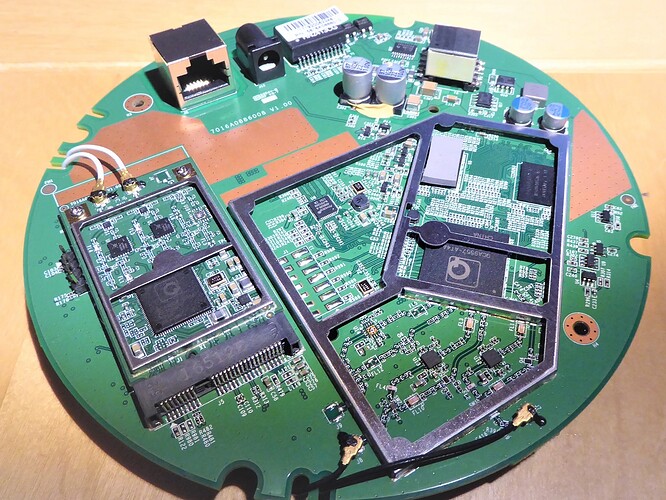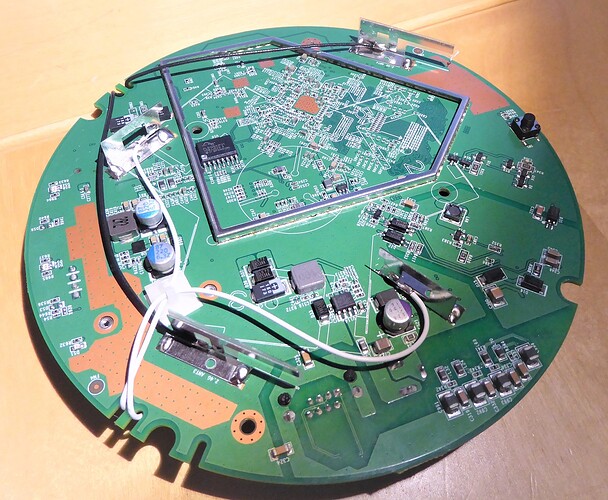Thank you.
Yeah i was implementing them and now both wifi's are working with good performance.
5ghz: Speedtest giving about same as my wired, docked laptop. ~300Mbit up and down. 1ms ping and 1ms jitter, 0,0% loss.
2.4ghz: 42down and 66up, 1ms ping, 1ms jitter, 0,0% loss.
My hopefully last question before doing a pull request on Github.
After adding the GPIO16-watchdog i'm getting this error on boot:
[ 5.359347] ath79-wdt 18060008.wdt: unable to register misc device, err=-16
[ 5.366459] ath79-wdt: probe of 18060008.wdt failed with error -16
...
[ 5.998146] init: - watchdog -
Is that something to worry about? Should i disable ath79-wdt fully in the DT?
Current bootlog:
Boot (PRI)-> run ramboot_openwrt
dup 1 speed 1000
*** Warning: no boot file name; using '1D01A8C0.img'
Using eth0 device
TFTP from server 192.168.1.66; our IP address is 192.168.1.29
Filename '1D01A8C0.img'.
Load address: 0x89000000
Loading: #################################################################
#################################################################
#################################################################
#################################################################
#################################################################
#################################################################
#################################################################
#################################################################
#################################################################
#################################################################
#################################################################
#################################################################
#################################################################
#################################################################
#################################################################
#################################################################
#################################################################
###
done
Bytes transferred = 5668543 (567ebf hex)
## Booting image at 89000000 ...
Image Name: MIPS OpenWrt Linux-5.4.86
Created: 2021-01-02 13:36:25 UTC
Image Type: MIPS Linux Kernel Image (lzma compressed)
Data Size: 5668479 Bytes = 5.4 MB
Load Address: 80060000
Entry Point: 80060000
Verifying Checksum ... OK
Uncompressing Kernel Image ... OK
Starting kernel ...
[ 0.000000] Linux version 5.4.86 (ahe@aheserver) (gcc version 8.4.0 (OpenWrt GCC 8.4.0 r15404-55e23f2c02)) #0 Sat Jan 2 13:36:25 2021
[ 0.000000] printk: bootconsole [early0] enabled
[ 0.000000] CPU0 revision is: 00019750 (MIPS 74Kc)
[ 0.000000] MIPS: machine is Extreme Networks AP3805i
[ 0.000000] SoC: Qualcomm Atheros QCA9558 ver 1 rev 0
[ 0.000000] Initrd not found or empty - disabling initrd
[ 0.000000] Primary instruction cache 64kB, VIPT, 4-way, linesize 32 bytes.
[ 0.000000] Primary data cache 32kB, 4-way, VIPT, cache aliases, linesize 32 bytes
[ 0.000000] Zone ranges:
[ 0.000000] Normal [mem 0x0000000000000000-0x000000000fffffff]
[ 0.000000] Movable zone start for each node
[ 0.000000] Early memory node ranges
[ 0.000000] node 0: [mem 0x0000000000000000-0x000000000fffffff]
[ 0.000000] Initmem setup node 0 [mem 0x0000000000000000-0x000000000fffffff]
[ 0.000000] Built 1 zonelists, mobility grouping on. Total pages: 64960
[ 0.000000] Kernel command line: console=ttyS0,115200n8 rootfstype=squashfs,jffs2
[ 0.000000] Dentry cache hash table entries: 32768 (order: 5, 131072 bytes, linear)
[ 0.000000] Inode-cache hash table entries: 16384 (order: 4, 65536 bytes, linear)
[ 0.000000] Writing ErrCtl register=00000000
[ 0.000000] Readback ErrCtl register=00000000
[ 0.000000] mem auto-init: stack:off, heap alloc:off, heap free:off
[ 0.000000] Memory: 248432K/262144K available (4893K kernel code, 191K rwdata, 1124K rodata, 4728K init, 196K bss, 13712K reserved, 0K cma-reserved)
[ 0.000000] SLUB: HWalign=32, Order=0-3, MinObjects=0, CPUs=1, Nodes=1
[ 0.000000] NR_IRQS: 51
[ 0.000000] random: get_random_bytes called from start_kernel+0x32c/0x520 with crng_init=0
[ 0.000000] CPU clock: 720.000 MHz
[ 0.000000] clocksource: MIPS: mask: 0xffffffff max_cycles: 0xffffffff, max_idle_ns: 5309056796 ns
[ 0.000007] sched_clock: 32 bits at 360MHz, resolution 2ns, wraps every 5965232126ns
[ 0.008294] Calibrating delay loop... 359.42 BogoMIPS (lpj=718848)
[ 0.042886] pid_max: default: 32768 minimum: 301
[ 0.047930] Mount-cache hash table entries: 1024 (order: 0, 4096 bytes, linear)
[ 0.055717] Mountpoint-cache hash table entries: 1024 (order: 0, 4096 bytes, linear)
[ 0.067952] clocksource: jiffies: mask: 0xffffffff max_cycles: 0xffffffff, max_idle_ns: 7645041785100000 ns
[ 0.078364] futex hash table entries: 256 (order: -1, 3072 bytes, linear)
[ 0.085711] pinctrl core: initialized pinctrl subsystem
[ 0.092112] NET: Registered protocol family 16
[ 0.121803] workqueue: max_active 576 requested for napi_workq is out of range, clamping between 1 and 512
[ 0.134974] clocksource: Switched to clocksource MIPS
[ 0.141410] NET: Registered protocol family 2
[ 0.146719] tcp_listen_portaddr_hash hash table entries: 512 (order: 0, 4096 bytes, linear)
[ 0.155676] TCP established hash table entries: 2048 (order: 1, 8192 bytes, linear)
[ 0.163861] TCP bind hash table entries: 2048 (order: 1, 8192 bytes, linear)
[ 0.171387] TCP: Hash tables configured (established 2048 bind 2048)
[ 0.178268] UDP hash table entries: 256 (order: 0, 4096 bytes, linear)
[ 0.185269] UDP-Lite hash table entries: 256 (order: 0, 4096 bytes, linear)
[ 0.192965] NET: Registered protocol family 1
[ 0.197655] PCI: CLS 0 bytes, default 32
[ 1.082981] random: fast init done
[ 4.806317] workingset: timestamp_bits=14 max_order=16 bucket_order=2
[ 4.819090] squashfs: version 4.0 (2009/01/31) Phillip Lougher
[ 4.825316] jffs2: version 2.2 (NAND) (SUMMARY) (LZMA) (RTIME) (CMODE_PRIORITY) (c) 2001-2006 Red Hat, Inc.
[ 4.849654] pinctrl-single 1804002c.pinmux: 544 pins, size 68
[ 4.856719] Serial: 8250/16550 driver, 1 ports, IRQ sharing disabled
[ 4.864130] printk: console [ttyS0] disabled
[ 4.868751] 18020000.uart: ttyS0 at MMIO 0x18020000 (irq = 9, base_baud = 2500000) is a 16550A
[ 4.877941] printk: console [ttyS0] enabled
[ 4.877941] printk: console [ttyS0] enabled
[ 4.886838] printk: bootconsole [early0] disabled
[ 4.886838] printk: bootconsole [early0] disabled
[ 4.902893] spi-nor spi0.0: s25fl512s (65536 Kbytes)
[ 4.908031] 10 fixed-partitions partitions found on MTD device spi0.0
[ 4.914569] Creating 10 MTD partitions on "spi0.0":
[ 4.919527] 0x000000000000-0x000000080000 : "u-boot-bak"
[ 4.925708] 0x000000080000-0x000000100000 : "u-boot"
[ 4.931594] 0x000000100000-0x000000140000 : "cfg1"
[ 4.937273] 0x000000140000-0x000000180000 : "cfg2"
[ 4.942953] 0x000000180000-0x0000001c0000 : "nvram4"
[ 4.948811] 0x0000001c0000-0x000000200000 : "nvram3"
[ 4.954680] 0x000000200000-0x000000240000 : "nvram2"
[ 4.960534] 0x000000240000-0x000000280000 : "nvram1"
[ 4.966383] 0x000000280000-0x000003f40000 : "firmware"
[ 4.981629] 0x000003fc0000-0x000004000000 : "art"
[ 4.988915] libphy: Fixed MDIO Bus: probed
[ 4.995894] ag71xx 19000000.eth: invalid MAC address, using random address
[ 5.316765] libphy: ag71xx_mdio: probed
[ 5.338422] ag71xx 19000000.eth: connected to PHY at mdio.0:05 [uid=004dd072, driver=Atheros 8035 ethernet]
[ 5.348876] eth0: Atheros AG71xx at 0xb9000000, irq 4, mode: rgmii-id
[ 5.355624] i2c /dev entries driver
[ 5.359347] ath79-wdt 18060008.wdt: unable to register misc device, err=-16
[ 5.366459] ath79-wdt: probe of 18060008.wdt failed with error -16
[ 5.374324] NET: Registered protocol family 10
[ 5.382912] Segment Routing with IPv6
[ 5.386779] NET: Registered protocol family 17
[ 5.391373] 8021q: 802.1Q VLAN Support v1.8
[ 5.396401] PCI host bridge /ahb/pcie-controller@180c0000 ranges:
[ 5.402645] MEM 0x0000000010000000..0x0000000011ffffff
[ 5.407963] IO 0x0000000000000000..0x0000000000000000
[ 5.413423] PCI host bridge to bus 0000:00
[ 5.417620] pci_bus 0000:00: root bus resource [mem 0x10000000-0x11ffffff]
[ 5.424601] pci_bus 0000:00: root bus resource [io 0x0000]
[ 5.430257] pci_bus 0000:00: root bus resource [??? 0x00000000 flags 0x0]
[ 5.437147] pci_bus 0000:00: No busn resource found for root bus, will use [bus 00-ff]
[ 5.445218] pci 0000:00:00.0: [168c:003c] type 00 class 0x028000
[ 5.451366] pci 0000:00:00.0: reg 0x10: [mem 0x00000000-0x001fffff 64bit]
[ 5.458308] pci 0000:00:00.0: reg 0x30: [mem 0x00000000-0x0000ffff pref]
[ 5.465186] pci 0000:00:00.0: supports D1
[ 5.469261] pci 0000:00:00.0: PME# supported from D0 D1 D3hot
[ 5.476094] pci_bus 0000:00: busn_res: [bus 00-ff] end is updated to 00
[ 5.482851] pci 0000:00:00.0: BAR 0: assigned [mem 0x10000000-0x101fffff 64bit]
[ 5.490296] pci 0000:00:00.0: BAR 6: assigned [mem 0x10200000-0x1020ffff pref]
[ 5.515749] Freeing unused kernel memory: 4728K
[ 5.520372] This architecture does not have kernel memory protection.
[ 5.526902] Run /init as init process
[ 5.994403] init: Console is alive
[ 5.998146] init: - watchdog -
[ 6.018312] kmodloader: loading kernel modules from /etc/modules-boot.d/*
[ 6.027884] kmodloader: done loading kernel modules from /etc/modules-boot.d/*
[ 6.045761] init: - preinit -
[ 6.428645] random: jshn: uninitialized urandom read (4 bytes read)
[ 6.538780] random: jshn: uninitialized urandom read (4 bytes read)
[ 6.723888] random: jshn: uninitialized urandom read (4 bytes read)
Press the [f] key and hit [enter] to enter failsafe mode
Press the [1], [2], [3] or [4] key and hit [enter] to select the debug level
[ 10.984441] eth0: link up (1000Mbps/Full duplex)
[ 10.991487] IPv6: ADDRCONF(NETDEV_CHANGE): eth0: link becomes ready
[ 11.029637] eth0: link down
[ 11.042947] procd: - early -
[ 11.046007] procd: - watchdog -
[ 11.604819] procd: - watchdog -
[ 11.608373] procd: - ubus -
[ 11.618472] urandom_read: 5 callbacks suppressed
[ 11.618479] random: ubusd: uninitialized urandom read (4 bytes read)
[ 11.661793] random: ubusd: uninitialized urandom read (4 bytes read)
[ 11.669516] procd: - init -
Please press Enter to activate this console.
[ 12.220187] kmodloader: loading kernel modules from /etc/modules.d/*
[ 12.258920] Loading modules backported from Linux version v5.8.18-0-gab435ce49bd1
[ 12.266553] Backport generated by backports.git v5.8.18-1-0-ga630fd46
[ 12.322500] xt_time: kernel timezone is -0000
[ 12.447014] PPP generic driver version 2.4.2
[ 12.456414] NET: Registered protocol family 24
[ 12.465713] urngd: v1.0.2 started.
[ 12.530851] ath10k 5.8 driver, optimized for CT firmware, probing pci device: 0x3c.
[ 12.551746] ath10k_pci 0000:00:00.0: enabling device (0000 -> 0002)
[ 12.560406] ath10k_pci 0000:00:00.0: pci irq legacy oper_irq_mode 1 irq_mode 0 reset_mode 0
[ 12.691999] random: crng init done
[ 16.134268] ath10k_pci 0000:00:00.0: qca988x hw2.0 target 0x4100016c chip_id 0x043222ff sub 0000:0000
[ 16.143671] ath10k_pci 0000:00:00.0: kconfig debug 0 debugfs 1 tracing 0 dfs 1 testmode 0
[ 16.155898] ath10k_pci 0000:00:00.0: firmware ver 10.1-ct-8x-__fW-022-ecad3248 api 2 features wmi-10.x,has-wmi-mgmt-tx,mfp,txstatus-noack,wmi-10.x-CT,ratemask-CT,txrate-CT,get-temp-CT,tx-rc-CT,cust-stats-CT,retry-gt2-CT,txrate2-Cf
[ 16.489178] ath10k_pci 0000:00:00.0: board_file api 1 bmi_id N/A crc32 bebc7c08
[ 17.418719] ath10k_pci 0000:00:00.0: 10.1 wmi init: vdevs: 16 peers: 127 tid: 256
[ 17.436506] ath10k_pci 0000:00:00.0: wmi print 'P 128 V 8 T 410'
[ 17.442841] ath10k_pci 0000:00:00.0: wmi print 'msdu-desc: 1424 sw-crypt: 0 ct-sta: 0'
[ 17.450990] ath10k_pci 0000:00:00.0: wmi print 'alloc rem: 24984 iram: 38672'
[ 17.522937] ath10k_pci 0000:00:00.0: htt-ver 2.1 wmi-op 2 htt-op 2 cal file max-sta 128 raw 0 hwcrypto 1
[ 17.532891] ath10k_pci 0000:00:00.0: NOTE: Firmware DBGLOG output disabled in debug_mask: 0x10000000
[ 17.704257] ath9k 18100000.wmac: Direct firmware load for ath9k-eeprom-ahb-18100000.wmac.bin failed with error -2
[ 17.714718] ath9k 18100000.wmac: Falling back to sysfs fallback for: ath9k-eeprom-ahb-18100000.wmac.bin
[ 18.282590] ieee80211 phy1: Atheros AR9550 Rev:0 mem=0xb8100000, irq=13
[ 18.317917] kmodloader: done loading kernel modules from /etc/modules.d/*
[ 71.277312] br-lan: port 1(eth0) entered blocking state
[ 71.282668] br-lan: port 1(eth0) entered disabled state
[ 71.288253] device eth0 entered promiscuous mode
[ 74.344341] eth0: link up (1000Mbps/Full duplex)
[ 74.349205] br-lan: port 1(eth0) entered blocking state
[ 74.354529] br-lan: port 1(eth0) entered forwarding state
[ 74.361690] IPv6: ADDRCONF(NETDEV_CHANGE): br-lan: link becomes ready

